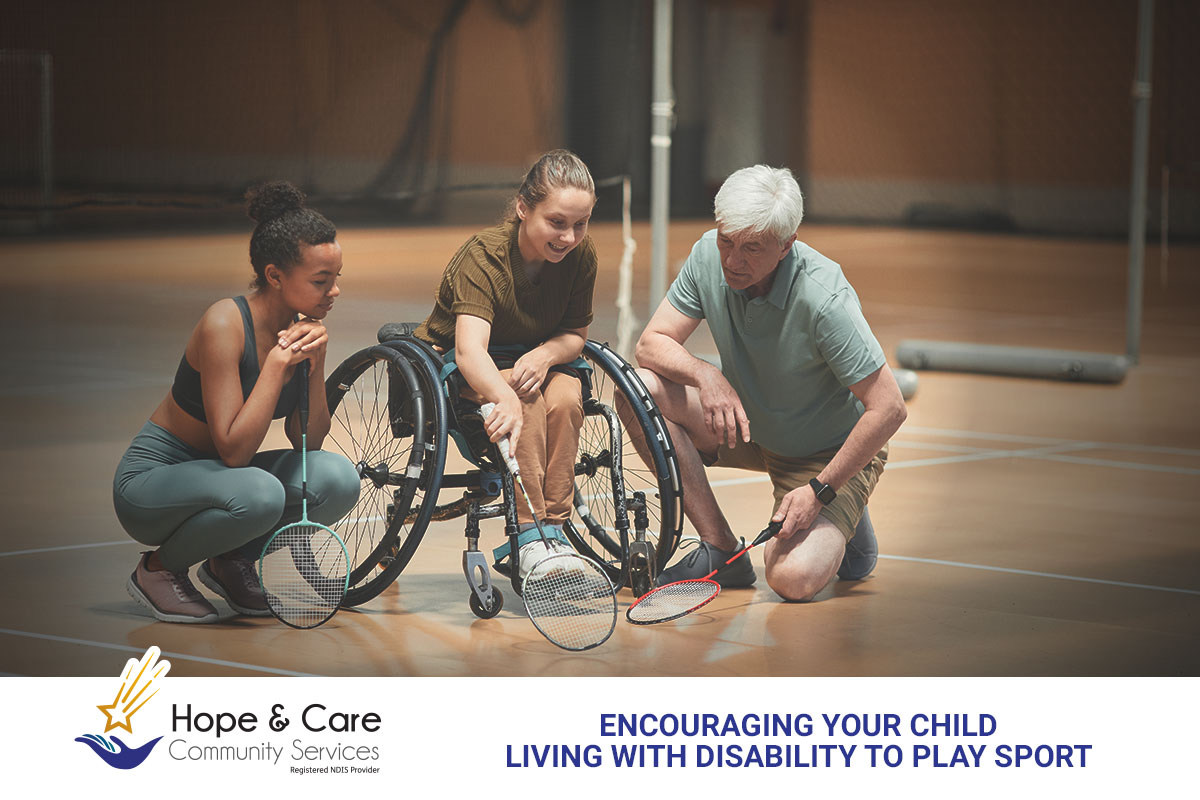
Getting active helps all children grow stronger, more confident and socially connected. For children living with disability, physical activity plays an even greater role improving physical health, boosting mental wellbeing and building independence.
In this article, you will learn how to help your child engage in sport, what benefits to expect and how NDIS supports can assist along the way.
Why Sport Matters for Children Living with Disability
Sport helps children develop more than just physical fitness. It promotes confidence, improves social skills and supports healthy emotional development.
For children with disability, regular participation in sport can:
- Build strength, mobility and coordination
- Improve cardiovascular health and sleep routines
- Strengthen immunity and increase energy levels
- Support focus, memory and mood
- Encourage independence and emotional regulation
When children get active early in life, they create healthy habits that last into adulthood and reduce the risk of chronic health conditions.
How Much Activity Should Children with Disability Do?
According to the Australian Department of Health, children aged 5 to 17 should aim for at least 60 minutes of moderate to vigorous physical activity each day. This can include activities that build muscle strength and bone health.
Here are three activity levels to consider:
- Light activity – easy movement like walking slowly, stretching or light play
- Moderate activity – noticeable increase in breathing, such as dancing, swimming or pushing a wheelchair briskly
- Vigorous activity – huffing and puffing, increased heart rate, such as cycling, running or playing competitive sport
Every child is different. Before starting a new sport or exercise routine, speak with your child’s NDIS support team or allied health professionals, including physiotherapists and occupational therapists. They can help assess which movements are safe, suitable and adaptable.
Start with Movement at Home
You do not have to begin with organised sport. In fact, many children with disability build confidence and skills through play-based movement at home.
Simple, fun activities can include:
- Dancing together to music
- Playing catch or rolling a ball
- Going for a walk, wheel or scoot around the block
- Trying balance or coordination games like Simon Says
These informal games help children develop motor skills, improve coordination and enjoy being active. They also give you the chance to see what your child naturally enjoys which can help guide sport choices later.
Talk to Your NDIS Support Team
Your child’s NDIS allied health professionals play an important role in supporting their physical development and safe participation in sport.
They can help by:
- Recommending sports suited to your child’s strengths
- Identifying any movement limitations or risks
- Creating personalised activity plans
- Suggesting assistive technology or adaptive equipment
- Guiding you through NDIS-funded participation pathways
By involving your NDIS care team early, you ensure that your child gets the right support and is set up for success in sport and recreation.
Find Inclusive Sports Programs in Your Area
Across Australia, there are more opportunities than ever for children with disability to join inclusive sports programs. These programs are designed to be fun, supportive and accessible often with trained staff and adaptive equipment.
Start your search with:
- Disability Sports Australia – connects families with local inclusive sports programs
- Abilities Unleashed – supports children with disability in sport and recreation
- Get Active – a national platform listing inclusive and accessible activities
You can also contact local sports clubs directly to ask if they offer modified versions of popular sports such as soccer, netball or basketball. Many junior clubs now run programs with flexible rules and inclusive formats.
Encourage Effort, Not Just Outcomes
One of the best lessons sport teaches is that effort matters more than results. For children living with disability, celebrating participation not just performance is key to long-term enjoyment.
You can encourage this by focusing on how your child feels, rather than how they perform. Ask questions like:
- “Did you have fun today?”
- “What was your favourite part of the game?”
- “What would you like to try again next time?”
This helps build emotional resilience, fosters a positive attitude and encourages your child to stay active, even after setbacks.
Teach a Growth Mindset Through Sport
Supporting your child to develop a growth mindset helps them understand that improvement comes with practice, not perfection. This mindset can be especially helpful in sport, where progress may take time.
Children with a growth mindset are more likely to say:
- “I cannot do it yet, but I’m learning.”
- “Mistakes help me get better.”
- “I will try again next time.”
On the other hand, a fixed mindset might cause children to give up or feel discouraged. You can model a growth mindset by praising effort and encouraging your child to focus on the journey not just the results.
Find Role Models to Inspire Your Child
Introducing your child to Paralympic athletes and inclusive sports role models can motivate them to keep going and dream bigger. The Paralympic Games are full of inspiring stories of perseverance and achievement.
Explore resources from Paralympics Australia, including:
- Athlete bios sorted by sport or disability
- “Cheer from Home” kits for families
- Information about sports classifications and events
Watching elite athletes with disability succeed can help your child see that anything is possible and that their goals are valid and worth pursuing.
Conclusion
Sport creates opportunities for connection, confidence and healthy development in every child. For children living with disability, participating in sport can build independence, improve physical and mental health and open the door to new friendships and experiences.
At Hope & Care Community Services, we support NDIS participants and families to navigate accessible sport pathways. Whether you are looking for skill-building activities, inclusive programs or expert advice we are here to help your child get active and stay involved.
With the right support, every child can play, move and grow through sport.
Want to learn more? Read other articles :
- Goal Setting for Teenagers and Young Adults
- NDIS Early Childhood Approach: Support for Kids Under 9
- Foundational Supports: Building Blocks of NDIS Success
HCCS is a registered NDIS provider. Learn more about our services.
♥ We are available in Brisbane! – Our team is just a call away!
